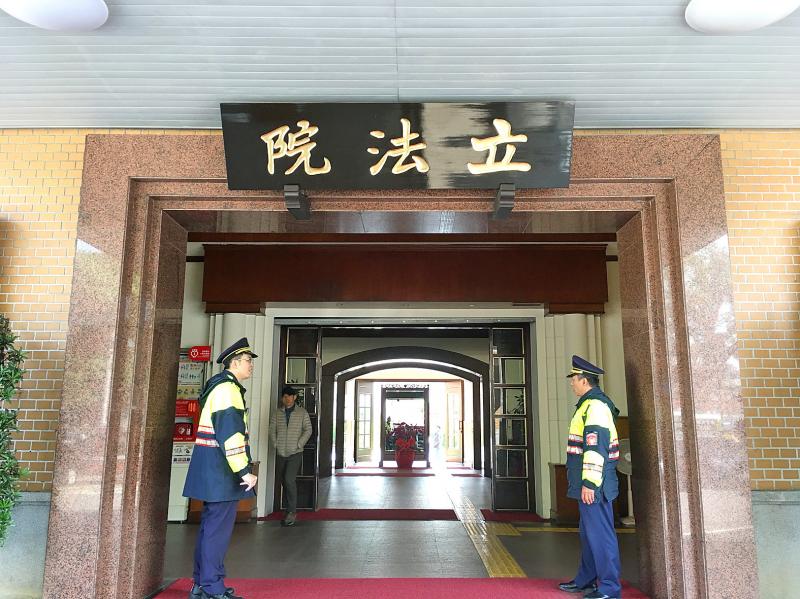Despite six failed negotiations with civic groups, the Democratic Progressive Party (DPP) administration is adamant about pushing through its proposals for introducing a lay judge system, rather than a jury system, sources with knowledge of the matter said yesterday.
Lawmakers have failed to reach a consensus on at least 100 draft articles on the lay judge system, which are expected to be voted on during an extraordinary session this week.
During the previous legislative session, the Judicial Yuan and the Executive Yuan pushed the legislation, which languished.

Photo: Lin Liang-sheng, Taipei Times
With the new session having begun in February, the Executive Yuan in March reintroduced the lay judge bill and titled it the “citizen participation in criminal trial procedures act.”
The DPP caucus has proposed that it be renamed the “national judge act.”
The DPP commissioned its caucus whip, Ker Chien-ming (柯建銘), to lead negotiations with civic groups, but after six meetings, no agreement was reached, sources said.
The DPP reportedly considered it “too risky” and “too much of a break from the current system” to implement a jury system, sources said, adding that it later rejected a compromise proposed by civic groups to combine the jury and lay judge systems.
The DPP caucus insisted on a six-year trial of the proposed lay judge system, because of concerns about the higher costs of a jury system, they added.
Separately, Northern Taiwan Society chairman Li Chuan-hsin (李川信) on Saturday called on the DPP to clarify its shift in support from a jury system to a lay judge system.
He said he was concerned that a lay judge system would allow career judges to sway lay judges’ verdicts, adding that the DPP should wait and not allow itself to be hijacked by people working in the judiciary.
Taiwan Nation Alliance deputy convener Wei Jui-ming (魏瑞明) said that attempting to ram through the bill in the extraordinary session would be reckless, and asked why the DPP administration needs to rush the effort.
A judicial reform bill of such importance should be given time and be discussed during the regular session, he said.

US President Donald Trump said "it’s up to" Chinese President Xi Jinping (習近平) what China does on Taiwan, but that he would be "very unhappy" with a change in the "status quo," the New York Times said in an interview published yesterday. Xi "considers it to be a part of China, and that’s up to him what he’s going to be doing," Trump told the newspaper on Wednesday. "But I’ve expressed to him that I would be very unhappy if he did that, and I don’t think he’ll do that," he added. "I hope he doesn’t do that." Trump made the comments in

NOT AN OPENING: Trump’s violation of international law does not affect China’s consideration in attacking Taiwan; Beijing lacks capability, not precedent, an official said Taiwanese officials see the US’ capture of the president of Venezuela as a powerful deterrent to Beijing’s aggression and a timely reminder of the US’ ability to defeat militaries equipped with Chinese-made weapons. The strikes that toppled Venezuelan President Nicolas Maduro signaled to authoritarian leaders, including Chinese President Xi Jinping (習近平), US President Donald Trump’s willingness to use military might for international affairs core to US interests, one senior official in Taipei’s security circle said. That reassured Taiwan, the person said. Taipei has also dismissed the idea that Trump’s apparent violation of international law could embolden Beijing, said the official, who was not

A cold surge advisory was today issued for 18 cities and counties across Taiwan, with temperatures of below 10°C forecast during the day and into tonight, the Central Weather Administration (CWA) said. New Taipei City, Taipei, Taoyuan and Hsinchu, Miaoli and Yilan counties are expected to experience sustained temperatures of 10°C or lower, the CWA said. Temperatures are likely to temporarily drop below 10°C in most other areas, except Taitung, Pingtung, Penghu and Lienchiang (Matsu) counties, CWA data showed. The cold weather is being caused by a strong continental cold air mass, combined with radiative cooling, a process in which heat escapes from

Snow this morning fell on Alishan for the first time in seven years, as a strong continental cold air mass sent temperatures plunging across Taiwan, the Central Weather Administration (CWA) said. The Alishan weather station, located at an elevation of about 2,200m in central Taiwan, recorded snowfall from 8:55am to 9:15am, when the temperature dropped to about 1°C, the CWA said. With increased moisture and low temperatures in the high-altitude Alishan area, the conditions were favorable for snow, CWA forecaster Tsai Yi-chi (蔡伊其) said. The last time snow fell at the Alishan weather station was on Jan. 10, 2018, while graupel fell there